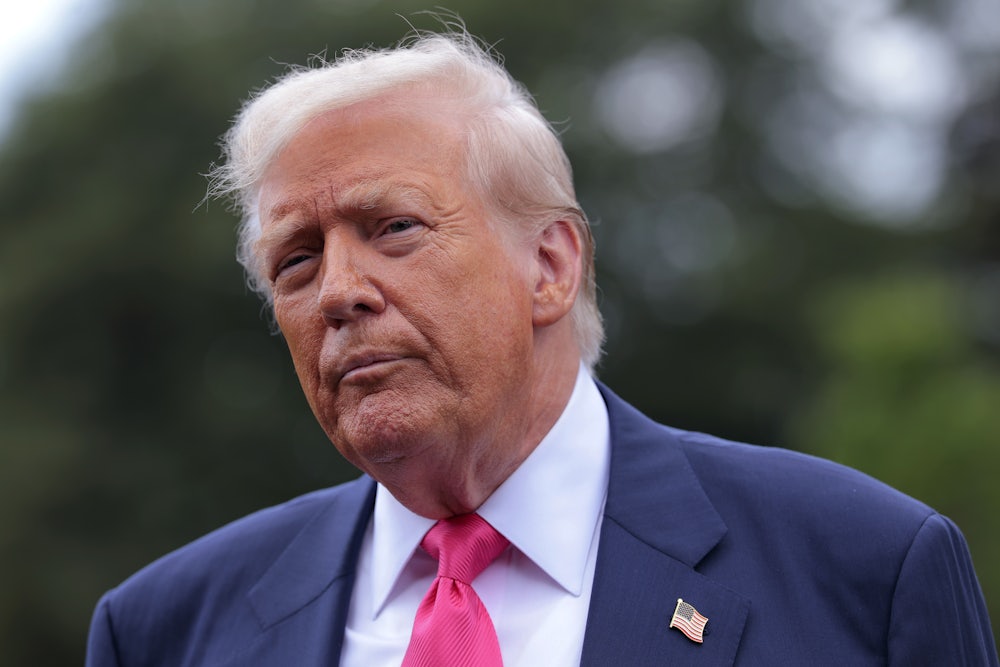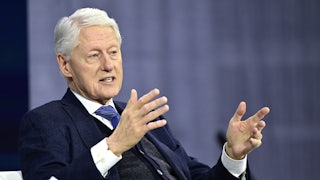Donald Trump’s second term has been, more or less from the moment he raised his hand before the Bible on January 20, an endless succession of horrors. Law-abiding residents are being disappeared to foreign countries by Trump’s army of masked-up goons. He just signed into law the largest transfer of wealth from the poor to the rich in the country’s history, while also ripping health care away from millions. Trump’s cuts in global aid have caused, according to some estimates, hundreds of thousands of deaths around the world. He also risked World War III with direct strikes on Iran, which seems only to have delayed nuclear enrichment by several months. And all the while, Trump and his family have been making millions selling the presidency.
This fascistic and corrupt administration is, by definition, scandalous; it has sparked widespread outrage and protest over its immoral, illegal abuses. But in a narrower sense, Trump’s second term has been free of the kind of ubiquitous political scandal that defined his first term, when allegations of collusion with Russia threatened to undo his presidency. Until now.
Compared to pretty much everything listed at the start of this piece, the Trump administration’s refusal to release all government files related to the late Jeffrey Epstein, the convicted child sex offender and alleged sex trafficker, is small beer. But—in no small part due to Trump’s own actions—it has erupted into a massive scandal. The Wall Street Journal’s publication on Thursday of the details of a birthday card Trump wrote to Epstein in 2003—the message suggested both close friendship and knowledge that his friend was, at the very least, a bit of a pervert—makes clear that major outlets are belatedly devoting resources to covering their relationship. Now this nascent scandal is poised to become exactly what Trump is labeling it in an attempt to discredit it: the next Russiagate.
It’s easy to forget that Russiagate—all those years of leaks and denials, of right-wing conspiracy theories, and the plodding Mueller inquiry—didn’t have to drag on the way it did. If Trump had disavowed Russian efforts to aid his campaign in 2016, it may not have led to a lengthy investigation and his impeachment. Instead, Trump not only used hacked materials to aid his campaign but repeatedly encouraged Russia to help him to defeat Hillary Clinton. This encouragement led many to understandably conclude that there was a kind of quid pro quo between Trump and Russian President Vladimir Putin—or, much less reasonably, to conclude that Trump, first as the Republican nominee and later as president, was being blackmailed and controlled by the Kremlin.
The truth was somewhat less salacious. Trump was openly encouraging Putin to help his campaign because he wanted his help—and because he thought Clinton was already “cheating” in numerous other ways. He also respected Putin as a strongman and had long railed against alliance systems like NATO—meaning that the Russian dictator had ample reason to aid Trump without a secret deal. Trump, meanwhile, didn’t disavow Putin because he never disavows anyone who supports him.
As a result, though, the scandal dragged on for years, undermining Trump’s first term practically from its inception. The drip-drip of news meant that the story never fully went away. As with Epstein, Russia was far from the most serious issue of Trump’s first term, which was defined by family separations at the border, efforts to rob millions of health care, and naked corruption and cronyism. But it was an effective metaphor for a president who was an aspiring autocrat who would do anything, even court a longtime U.S. foe, to amass more power.
The Epstein scandal threatens to be something similar, and possibly worse. With Russiagate, the right largely stood in lockstep behind Trump, echoing his complaints that it was a “witch hunt” and a “hoax.” The problem with the Epstein scandal is that the leading propagators of various conspiracy theories relating to the pedophile financier are strident backers of Trump himself. The president’s denials ring hollow given his long-standing friendship with Epstein.
As with Russiagate, it seems possible—perhaps even likely—that the most salacious allegations will be false; there is, for instance, no evidence that Trump visited Epstein’s notorious private island. But that hardly matters. Trump again faces two clear choices, and both are bad: He can continue to stonewall the release of all files on Epstein and hope that people move on (which they probably won’t do), or he can release everything and have to own up to the fact that he was friends with the twenty-first century’s most notorious pedophile (that is, assuming he wasn’t also an Epstein client). For now, Trump is taking the first approach. On Thursday, he demanded the release of grand jury testimony in the Epstein case (in which he is unlikely to appear). It seems highly unlikely that will satisfy anyone, particularly those in MAGA who have been demanding the full release of the “Epstein files.”
The result is a scandal that, like Russiagate before it, serves as an apt metaphor for Trump’s presidency. His failure to release the full Epstein files, which he had said in 2024 he would do, is the most high-profile broken promise of many. He has also provided weaponry to Ukraine, is kicking people off of health care, and is even waffling on deporting undocumented immigrants in certain industries, rankling many of his right-wing allies. It’s also a reminder of the company Trump keeps, and who he’s looking out for as president: not the working class, but rich elites.
With Russiagate, it was possible to see how it might end Trump’s presidency. That’s much harder to imagine with the Epstein scandal—not only because of the dimensions of the scandal but because of how much more beholden today’s Republican Party is to MAGA. But there are signs that it could be equally damaging: a nagging scandal that never goes away no matter how much Trump rages against it, and which weakens his presidency with each passing day.






